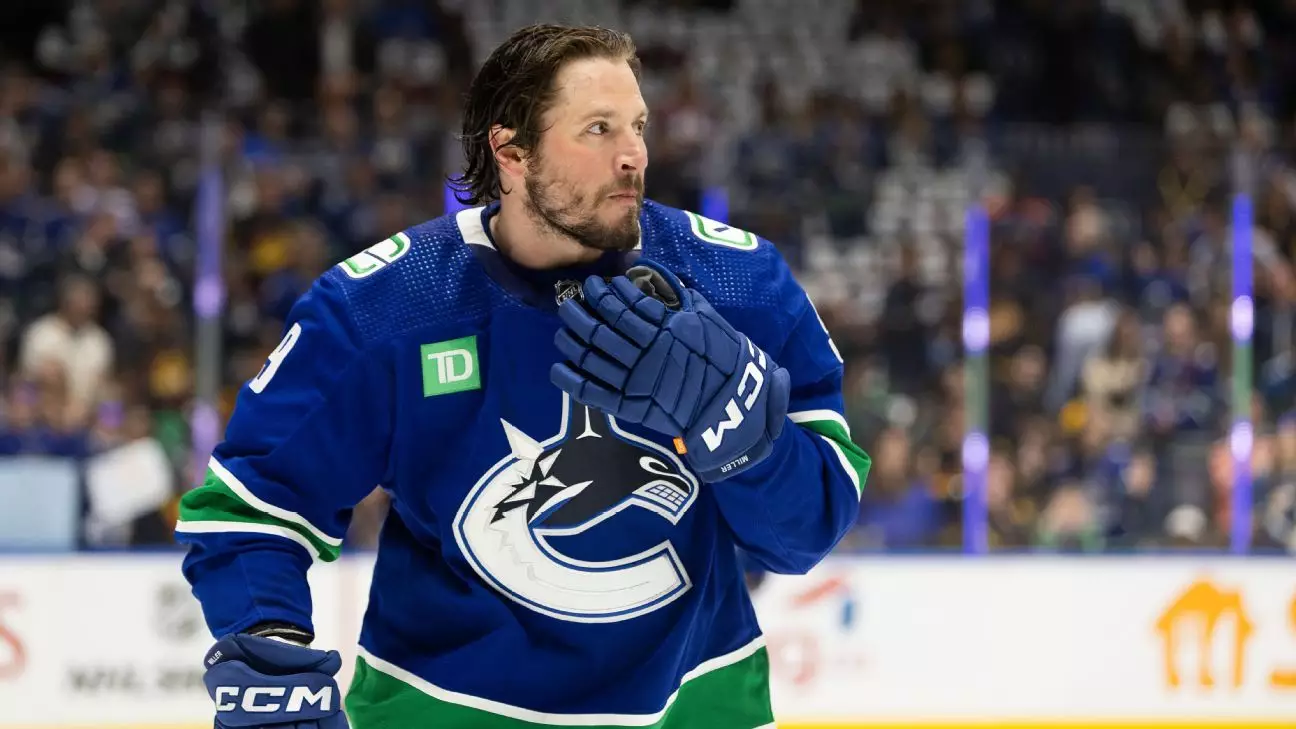The Vancouver Canucks find themselves at a precarious juncture in the 2023 season, as swirling rumors about potential trades loom over the team like clouds before a storm. The alleged near-trade of forward J.T. Miller to the New York Rangers has sparked debate among fans and analysts alike. Vancouver’s general manager, Patrik Allvin, has chosen to remain tight-lipped about the details, choosing instead to emphasize a forward-facing mentality. In a league where player transactions and interpersonal relationships can affect on-ice performance, the situation serves as a poignant reminder of the complexities involved in professional sports management.
Reports indicate that the Canucks had discussions about possibly trading Miller, which caused concern among fans and the player himself. With the Canucks grappling for traction in the NHL standings, Allvin’s evasion of specific trade discussions demonstrates a broader strategy: a focus on the present rather than an uncertain future. Miller, who has significantly contributed to the team’s scoring this season and has been a reliable player since his arrival in Vancouver, was reportedly nearly benched during a game against the Edmonton Oilers due to potential trade talks.
In the wake of these rumors, Miller himself remains unflappable, indicating a mindset focused on continuing to play regardless of the external noise. With 31 points in 35 games, Miller’s offensive prowess and experience are crucial assets to a struggling Canucks squad that is currently fighting to return to playoff contention.
An intriguing subplot in Miller’s narrative centers around his relationship with teammate Elias Pettersson. While both players have publicly denied any ongoing conflict, past tensions have been a source of speculation among fans and pundits. Former coach Bruce Boudreau hinted at a complicated history between the two, citing issues that may have originated from the quality of their linemates and Miller’s competitive nature.
The public outburst during a practice, where Miller allegedly referred to Pettersson as a “baby,” painted a less-than-cordial picture of their interactions. Such interpersonal dynamics often extend beyond the locker room, infiltrating media narratives and negatively impacting team cohesion. In professional sports environments where relationships can either bolster or hinder team success, this tension adds a layer of complexity to the current evaluation of the Canucks’ roster.
Vancouver’s position of relative mediocrity, with a 20-15-10 record, underscores the urgency for strategic decision-making. The team is currently outside of a playoff spot in the Western Conference, which adds pressure on management to reevaluate not only player trades but the overall team composition.
Beyond Miller and Pettersson, Allvin has hinted that trade discussions are ongoing regarding multiple roster members. This creates an unsettling atmosphere for players who must deliver results while enduring the anxiety of potential upheaval. However, Allvin’s assertion that he believes in the team’s core suggests that he sees promise in their ability to rebound.
The environment within the Canucks also hinges on the leadership of head coach Rick Tocchet. Allvin has expressed faith in Tocchet’s ability to guide the team, especially in turbulent times. With the Canucks retaining a club option on Tocchet through the 2025-2026 season, the narrative appears to indicate that management is not only focusing on immediate outcomes but also on long-term growth and stability.
As far as Allvin is concerned, team morale amid external pressures is paramount. His acknowledgment of the challenges that players face concerning rumors and public scrutiny illustrates his commitment to creating a secure environment for athletes to thrive.
The interplay of trade rumors, player relationships, and coaching strategies creates a compelling scenario for the Vancouver Canucks. As the season progresses, it remains to be seen how management will navigate the dual demands of maintaining a competitive roster while managing the psychological landscapes within the team. For J.T. Miller, the challenge is balancing his own focus on performance with the uncertainty of his future in Vancouver. Whether the Canucks can regroup and capitalize on their perceived potential will hinge on a delicate balance of managerial decisions, player relationships, and collective resilience. As they work through these issues, fans can only hope for clarity and success on the ice.


Leave a Reply